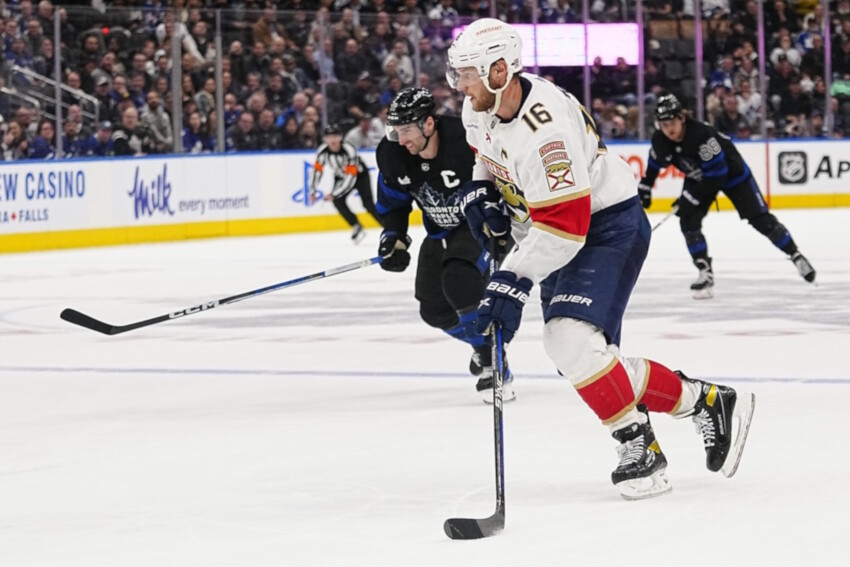The Florida Panthers entered the 2025–26 season with a legitimate dynasty mindset — two straight Stanley Cups, a star-laden roster, and futures odds that had them firmly in the championship conversation.
That sense of inevitability was suddenly hit when captain Aleksander Barkov went down in the club’s opening training-camp session and later underwent major knee surgery. The result: sportsbooks sharply repriced Florida’s Stanley Cup futures, and bettors who had them near the top of their tickets are reassessing risk and value.
Where the Panthers Stood Coming In
Florida’s 2024–25 campaign cemented them as the league’s top dog — they raised the Stanley Cup banner and returned a roster built for postseason success. Bookmakers treated them like a top-tier favorite in early futures markets; opening lines in some books had the Panthers among the top three teams to win the next Cup, alongside the Carolina Hurricanes and Edmonton Oilers.
Those pre-injury odds reflected last year’s hardware and stability up and down the lineup, goaltending confidence, and playoff-hardened depth.
Pre-Injury Odds vs. the Market Reaction
Before Barkov’s scare, several books priced Florida as one of the more attractive futures plays — reports indicated markets showing the Cats as co-favorites or hovering in the +650 to +750 range at certain shops. In short, bettors were comfortable putting money down on another deep Florida run. Then the injury news arrived, and the market reacted quickly — many books moved Florida out of the absolute favorites into a second-tier group of contenders.
The Updated Numbers: How Much Did the Panthers Fall?
The market moved dramatically after the club confirmed Barkov would undergo surgery; Florida’s odds lengthened across major sportsbooks. Multiple outlets reported the Panthers slipping from roughly +650–+750 territory to something closer to +1000–+1100 at a number of the larger books.
Essentially, they went from first or second on the odds board, depending on the book, to behind teams like the Tampa Bay Lightning, Vegas Golden Knights, Colorado Avalanche, and, in some places, the Dallas Stars. This dramatic fall reflects the market assigning a noticeably lower probability to a three-peat without their captain.
Who is Aleksander Barkov — and Why Does his Absence Matter?
This is the crucial piece. Barkov is not just another top-six forward; he’s the Panthers’ captain, a two-way engine, and the stylistic fulcrum of Florida’s top line. He’s spent years drawing shutdown minutes, creating offense in transitional moments, and — perhaps most importantly for playoff hockey — stabilizing a team through the postseason grind.
The injury report lists a complicated right-knee procedure involving ACL and MCL repair and an expected 7–9 month recovery timeline. This effectively takes Barkov out of the regular season and seriously doubts his playoff availability. That combination of leadership, two-way impact, and playoff-level experience is why bookmakers and bettors reacted so strongly.
Tangible Roster and Schematic Implications
Barkov’s absence is felt on multiple levels. Offensively, his playmaking and high-danger driving force free up teammates and create better matchups; without him, the Panthers lose a primary set-up creator who often draws elite defensive attention. Defensively, Barkov’s ability to play heavy minutes in defensive-zone draws and penalty-kill situations meant coaches could hide lesser linemates less frequently. On special teams, his faceoff work and situational awareness mattered in tight postseason games, and these are areas where marginal differences can swing series.
In simple wagering terms, Florida loses both a statistical contributor and a stabilizing presence that bookmakers implicitly priced into the pre-injury lines.
What Bettors Should Consider — Short and Long Term
- Odds value shifting – When favorites lose a cornerstone player, the shift in odds can create both risk and opportunity. If you had pre-injury futures on Florida, your stake became more speculative; if you’re market hunting, Florida’s new lines might be tempting if you believe the team’s depth can compensate. But remember: favorites fall because their probability has genuinely declined.
- Depth and replacements – Look closely at who steps into Barkov’s role. Teams with capable internal options and tactical flexibility will weather absences better than those that can’t replicate the lost minutes. For Florida, evaluate whether their other centers and top-six forwards can cover macro responsibilities like defensive-zone starts and high-traffic chance creation. That assessment should inform any bets on game lines, series props, or futures.
- Shop the lines—This is textbook line-shopping territory. Books will react differently to injuries and public money; some will overreact and create comparative value elsewhere. Understanding odds and markets for NHL bets in Canada is crucial. Compare moneyline and puck lines to better understand where the market truly believes the drop-off lands.
- Be cautious with correlated parlays and props – Without Barkov, correlated bets that relied on his contributions (first goal, multi-point props, top-line scoring outcomes) grow riskier. Same-game parlays that lean on Florida’s top-line production should be recalibrated. Use smaller units or avoid heavy correlation until the team’s new lines gel.
Big-Picture: Dynasty Hopes vs. Realistic Recalibration
In sports betting, narratives are powerful, and the narrative of a three-peat is compelling. However, sportsbooks respond to data and depth realities, and Barkov’s surgery changed that calculus immediately. The Panthers aren’t dead in the water; they remain a deep team with championship experience. Still, losing a captain of Barkov’s caliber reduces the margin for error in a long season and the playoffs.
For fans and wagerers alike, the situation shifts the season’s storyline — from talk of a historic three-peat to a more nuanced question of how championship depth, coaching, and timing will determine whether the Panthers can still beat long odds.



